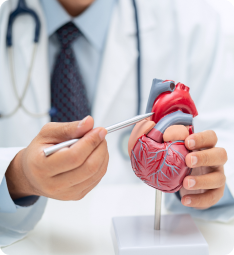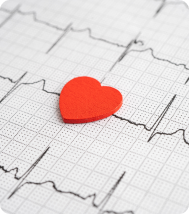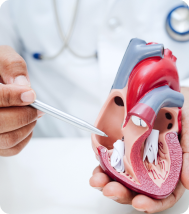Heart Arrhythmia
Heart Arrhythmia
Arrhythmia is an irregular heartbeat caused by disruptions in the heart's electrical signals. It is quite common, especially as people age. While many cases are harmless, some can be serious and require medical attention.


What Is Arrhythmia?
Arrhythmia, sometimes called dysrhythmia, refers to an irregularity in the heart's rhythm. In a healthy heart, electrical signals coordinate contractions of the heart chambers, resulting in a steady heartbeat. The normal resting heart rate for most adults ranges from 60-100 beats per minute. However, arrhythmia disrupts these signals, causing the heart to beat too fast, too slow, or in an irregular pattern.
The severity of arrhythmia can range from mild to life-threatening. Some arrhythmias may not cause any noticeable symptoms and may not require treatment. However, others can significantly impact the heart's ability to pump blood, potentially leading to serious complications.
What Are the Different Types of Arrhythmia?
Arrhythmia may be classified into different types based on whether they cause slow, fast, or irregular heart rate or the heart's affected part.
- Tachycardia – This refers to a fast heartbeat, with a heart rate faster than 100 beats per minute.
- Bradycardia – This is a slow heartbeat where the resting heart rate is slower than 60 beats per minute.
- Premature Heartbeat – Sometimes referred to as extra heartbeat, this occurs when the signal to beat comes too early, causing a pause followed by a stronger beat as the heart returns to its regular rhythm.
- Supraventricular Arrhythmias – These arrhythmias arise in the upper chambers of the heart, called the atria. This can manifest in several forms:
- Atrial Fibrillation – This is the most common type. Here, the atria quiver irregularly instead of contracting effectively. This can lead to a rapid and irregular heart rate.
- Atrial Flutter – A similar condition to atrial fibrillation, atrial flutter involves rapid, but more organised, electrical impulses in the atria. It can sometimes progress to atrial fibrillation.
- Supraventricular Tachycardia – This is characterised by a very fast heart rate originating above the ventricles. SVT episodes can come and go suddenly.
- Ventricular Arrhythmias –These arrhythmias take root in the heart's lower chambers, the ventricles. Common types include:
- Ventricular Tachycardia – This involves a rapid heartbeat originating in the ventricles. Ventricular tachycardia does not always cause problems, especially for those with healthy hearts. However, it may last longer for individuals with heart problems, leading to ventricular fibrillation.
- Ventricular Fibrillation – This is a chaotic electrical activity in the ventricles, causing the ventricles to quiver instead of pumping blood effectively. This is a medical emergency, as it can rapidly lead to cardiac arrest.
Common Symptoms of Arrhythmia
Some people with arrhythmias may experience no symptoms at all, while others may have noticeable or even debilitating ones. Common symptoms include:
- Palpitations – This is often described as a fluttering, pounding, or racing heartbeat
- Shortness of Breath – Difficulty breathing, especially with exertion
- Chest Pain or Tightness – This can range from mild to severe discomfort
- Dizziness or Lightheadedness – Feeling faint or unsteady
- Fatigue – Unusual tiredness
- Fainting or Near-Fainting Episodes – Loss of consciousness
The heart's rhythm is governed by electrical signals originating in a specialised group of cells called the sinus node. These signals travel through the heart, triggering contractions in specific chambers at precise intervals. This coordinated activity ensures efficient blood flow throughout the body.
However, some conditions and other factors may affect this process, causing irregularities in the heart rate. These include:
- Coronary Artery Disease (CAD) – Blockages in the heart's arteries can weaken the heart muscle, leading to irregular rhythms.
- Heart Failure – Weakened heart muscles struggle to pump blood efficiently, often resulting in arrhythmias.
- Heart Valve Diseases – Problems with the heart's valves can disrupt the normal flow of blood, contributing to arrhythmias.
- Congenital Heart Defects – Birth defects affecting the heart's structure can also impact its electrical system.
- Electrolyte Imbalances – Low levels of potassium, magnesium, or calcium can disrupt the heart's electrical signals.
- Medications – Some medications can have side effects that affect heart rhythm.
Several factors can influence the development of arrhythmias:
- Age – The risk of arrhythmias increases with age.
- Lifestyle factors: Smoking, excessive alcohol consumption, and lack of exercise can contribute to heart health issues, including arrhythmias.
- Medical Conditions – Some conditions, like high blood pressure, sleep apnoea, obesity, diabetes, thyroid disorders, and low blood sugar can trigger arrhythmias.
- Stress and Anxiety – Emotional stress can trigger arrhythmia episodes in some individuals.
Diagnosing arrhythmias often involves several tests to accurately pinpoint the nature and cause of the irregular heartbeat. Common diagnostic tests include:
- This is the most common and initial test for arrhythmias. An ECG records the electrical activity of the heart and detects many types of arrhythmias.
- An echocardiogram uses sound waves to create images of the heart. It can also help identify underlying heart conditions that may be causing the arrhythmia.
- An EPS involves inserting thin, flexible tubes (catheters) with electrodes through blood vessels into the heart. These catheters can stimulate the heart to induce arrhythmias and study their electrical patterns to determine the best treatment option.
- Blood tests can provide important information about overall heart health. They can help identify electrolyte imbalances, thyroid problems, or other conditions that might contribute to arrhythmias.
Some individuals with no symptoms do not require treatment, while others may need treatments to manage symptoms and prevent potential complications. The recommended treatment varies depending on the type, severity, and underlying cause of the arrhythmia.
- Medications – Medications include antiarrhythmic agents to regular the heart’s rhythm and beta-blockers or calcium-channel blockers to slow heart rate. A cardiologist may also prescribe anticoagulation or blood-thinning medications to reduce the risk of stroke due to arrhythmia.
- Cardioversion – This is a procedure performed under anaesthesia. It uses electrical shocks to restore a normal heart rhythm, often to treat atrial fibrillation and atrial flutter.
- Catheter Ablation – This procedure involves using heat, cold, or radiofrequency energy using a catheter to destroy the abnormal heart tissue causing the arrhythmia.
- Pacemaker – This is a small, battery-operated device implanted in the chest to regulate the heart's rhythm. It sends electrical impulses to stimulate the heart to beat at a normal rate.
- Implantable Cardioverter Defibrillator (ICD) – This is a small, battery-powered device implanted in the chest to treat life-threatening arrhythmias, such as ventricular tachycardia and ventricular fibrillation. It monitors the heart's rhythm and delivers an electric shock if needed to restore a normal rhythm.
Left untreated, arrhythmia may lead to various conditions and complications, such as:
- Stroke
- Heart failure
- Cardiomyopathy
- Cardiac arrest
Adopting a heart-healthy lifestyle is helpful in managing or lowering the risk of arrhythmias.
- Diet and Exercise – A balanced diet with fruits, vegetables, whole grains, and lean proteins supports heart health. Additionally, foods rich in omega-3 fatty acids can also lower blood pressure and reduce inflammation. Regular physical activity helps control weight, strengthens the heart, and improves overall cardiovascular function.
- Stress Management – Chronic stress can contribute to heart problems. Incorporate relaxation techniques like meditation, yoga, or deep breathing into your routine.
- Limiting Stimulants – Excessive caffeine and alcohol consumption can affect heart rhythm.
- Practise Good Sleep Habits – Adequate sleep is vital for overall health, including heart health. Aim for 7-9 hours of quality sleep each night.
While occasional heart palpitations or irregularities might not be cause for immediate alarm, you should consult a cardiologist if you:
- Are experiencing persistent or recurring symptoms
- Have medical conditions like coronary artery disease, congestive heart failure, high blood pressure, diabetes, or a family history of heart disease
- Experience symptoms like chest pain, lightheadedness, or difficulty breathing
- If you're experiencing signs of arrhythmia or suspect you may have it, consult heart specialist (cardiologist) Dr Eric Hong at EH Heart Specialist for an accurate diagnosis today.












